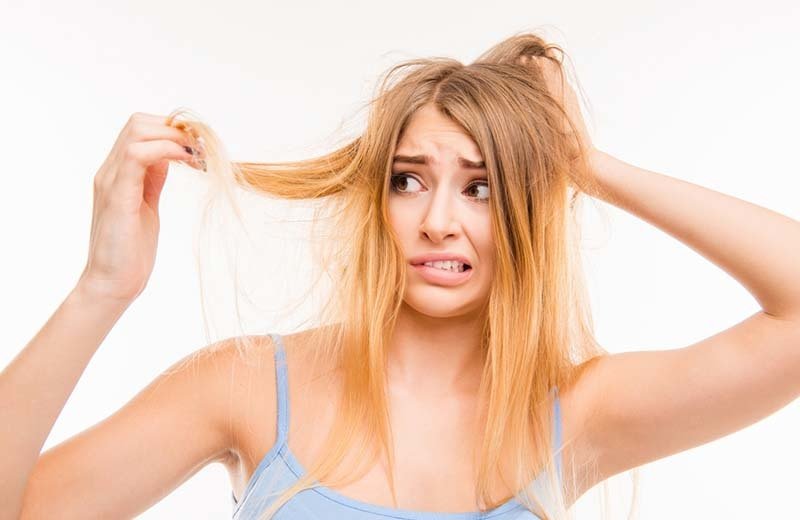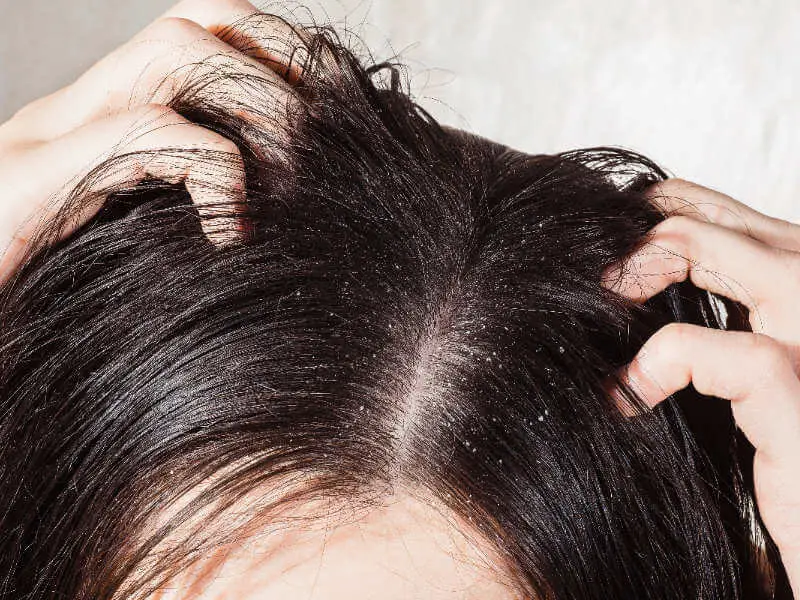
Our editors independently research, select, and recommend the best products. Some of these may be affiliate based, meaning we earn a small commission (at no additional cost to you) if items are purchased.
It is not uncommon to hear about talks concerning hard water and cold water. In America, most houses are affected by the presence of hard water.
Hard water is not very harmful to your health but damages the hair because of the chemicals like calcium and magnesium it.
A lot of shampoo companies come out with false information claiming that their products can treat the side effects caused by hard water.
The truth of the matter is that the hair can be saved if the root cause of the problem is eliminated which is hard water. If you live in an area that has hard water, you should get the for your home a whole-house water softener to help you soften your hard water.
Problems Hard Water Can Cause
Hard water gives you a lot of work with your hair. When you use hard water to wash your hair, the debris that comes out of the shampoo will stick to the hair. It makes your hair very difficult to handle.
The high amount of chemicals like calcium and magnesium is what makes water hard unlike soft water. Most households prefer to use soft water because it is safer to use. They are very much aware of the effects that hard water causes on the hair.
Due to the number of harsh chemicals, hard water can cause problems like:
- Dry hair
- Loss of hair
- Dandruff
- Thinning hair
- Tangled hair
- Hair breakage
Let’s talk about each one in the list below:
1. Difficult Hair
When you use hard water to wash your hair, it can cause your hair to tangle. This will make it difficult for the comb to pass through the hair. The hair becomes very difficult to manage.
The tangling allows the debris usually in shampoo stick to the hair when washing. The hair continues to accumulate debris which will cause it to be greasy. Using hard water makes you develop bad hair.
2. Dry Hair
Another effect of hard water on the hair is that it makes the hair dry. Even when you apply all the hair oils and leave-in conditioners, the air will still be dry. You begin to develop poor hair texture quality as a result of using hard water.
The chemicals that are in hard water get rid of the hair’s natural oil and it causes the hair to be dry. Dryness of the hair gives the hair a dull and unhealthy look. The hair lacks shine and lustre.
3. Dandruff
This is a very common problem that people normally face as a result of using hard water often. Using hair dandruff treatments does not guaranty a relief from this condition.
It would be very difficult to get rid of dandruff unless you discontinue the use of hard water on the hair.

What causes the dandruff is that the chemicals and conditioners do not fully get washed off when you use hard water. The result of the shampoo and conditioner remaining on the hair will cause the scalp to flake.
4. Thin Hair
When you wash your hair with this kind of water, it will cause copper strands to remain on the hair.
The result of the copper strands on the hair is that it causes the hair to become week. Gradually the hair starts getting very fragile and you will notice your hair thinning.
5. Hair Breakage
The hair begins to break when it starts getting thin from using hard water on the hair. Weak hair is a result of the high chemical content in the water and the only way it can be treated is by using only soft water on the hair.
8 Easy Ways Of Saving Your Hair From Hard Water
Are you having problems with your hair? If you have been using hard water on your hair, it just might be the cause.
Using hair conditioners will not be able to save your hair from further damage unless you stop using hard water on your hair.
When washing hair with hard water, it forms a scaly film on the hair. The effect of this is that moisture is prevented from entering the hair. Hard water causes the hair to be dull, dry, tangled and discolored. It also causes skin problems on the scalp like dandruff.
If you want to keep a healthy hair, there are ways you can protect your hair from hard water.
Here are some of the ways that can definitely work:
1. Rinse Hair With Vinegar
When you use vinegar on your hair, it helps to remove the scaly film that has been formed on the hair from using hard water. Aside from this, it also balances the hair’s pH level.
Vinegar is very useful to get healthy hair and doesn’t make the hair tangle. It gives your hair a soft and silky feeling. Mix a tablespoon of vinegar or apple cider vinegar in 3 cups of water.
After washing your hair with a shampoo, you can apply this mixture to your hair. Leave for some minutes and then rinse it off your hair. To avoid hair dryness, use this treatment at least once in a week.
2. Clarifying Shampoo
Clarifying shampoo does not only clean the hair but also gives the hair body and makes it shine. When choosing a clarifying shampoo, you should look out for the ingredients in it.
Some clarifying shampoo has harsh compounds that can weaken the hair. Make sure to use a clarifying shampoo with natural ingredients that are safe to use.
3. Use Boiled Water Or Filtered Water
To protect your hair from the damage that hard water can cause, it is safe to use boiled water to rinse the hair. You can use this as a temporary solution especially if you are going to a place where they have hard water.
Filling up boiled water in bottles can cause you to carry a lot of bottles around. It is better to use a filter jug instead to avoid plastic waste.
4. Rinse Hair With Lemon/Lime
Just like what vinegar does the hair, lemon also helps to remove the scaly film that is created on the hair from hard water.
Mix a tablespoon of lemon with three cups of water. After washing the hair with shampoo, apply the mixture to the hair and rinse off after a couple of minutes.
Lemon will make the hair shine and have lustre. It also helps with the treatment of dandruff with its antiseptic properties.
This treatment, however, should not be used all the time because lime juice can make your hair lighten with continuous use.
5. Use Soft Water
Soft water is good for the hair. It helps to remove the scaly substance (limescale) that is created from hard water. It gets rid of calcium and magnesium that causes the limescale.
It can be quite expensive getting a water softener but it helps to solve the problems you are having with your hair. To get the best water softener in your home, you can look at water softener system reviews on our website to see which one will work best.
It is also from these water softener system reviews that you can get the most affordable water softener that fits your budget.
6. Use Leave-In Conditioner
Using a conditioner will not remove limescale from your scalp but what it does is to give you a good hair with lustre.
You can apply a leave-in conditioner to your hair after you have washed the hair. Use leave-in conditioner products that contain almond oil, argan oil and jojoba oil to make your hair shine.
7. Shower Filter
This is a cheaper option than getting a water softener. A shower filter removes limescale from the hair and other harsh chemicals contained in the hard water like chlorine. It can easily be attached to your shower unit.
You can find a couple of reviews of water softener shower heads on our website.
8. Rain Water
The water that comes from rain is soft and is good for the hair. The best part about it is that it is affordable because it is free.
Rainwater makes the hair soft and gives it shine. The problem, however, is that you don’t get to see rainfall every day.
Bottom Line
When you continue using hard water on the hair, it will continue to develop more problems. The best solution is to stop using hard water on your hair and install a reliable water softener.
When you soften the water in your home, it will reverse the damage that has been caused by hard water on the hair.
A lot of companies mislead people into thinking that shampoos can cure the damages done to their hair.
I really hope this article on how to save your hair from hard water was helpful to you.
Recommended Reading
The Positive And Negative Effects Of Hard Water And The Potential Health Impacts
Soft water has a salty taste, and this makes it not favorable for drinking. Hard water has its positive and negative sides.
What Exactly Is Water Hardness And How Bad Is It For You
There is no evidence that hard water is harmful to human health, and most studies have failed to show any clear linkages for or against the health effects..
7 Tips On How to Get Rid of Hard Water Stains. Make Your Life Easier Using These Tricks.
Is hard water causes you problems? Stains, spots? Learn how you can get rid of hard water and make your life easier with these simple little tricks.
6 Tips On How To Remove Limescale
Limescale is potentially harmful to the plumbing systems as well as the vessels that contain water in the typical household.


